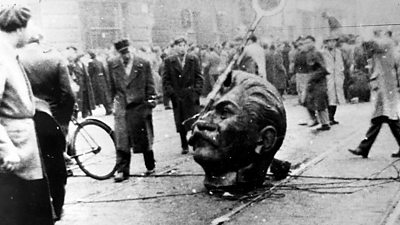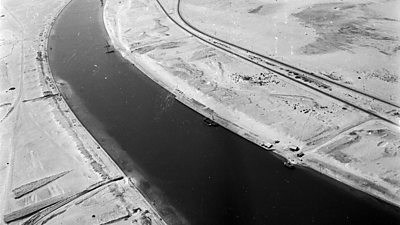The Hungarian uprising and the Suez Canal crisis of 1956 changed public attitudes towards international communism and Britain’s claim to be a world leader. They were critical turning points and in both instances the �鶹�� played an important, and sometimes vital, part in mapping and reporting unfolding events.
In the space of two months in October and November 1956, the emotional and political upheavals associated with both were inscribed into the historical memory of the period.
The Hungarian uprising, a popular revolt against the communist authorities, appeared at first to have been successful before eventually being crushed by the might of Soviet forces.
The nationalisation of the Suez Canal by Egypt sparked an unsuccessful military invasion by Britain, France and Israel to protect their strategic and commercial interests in the region.

Radio played a central role during the 1956 Hungarian uprising: as an information service for listeners in Hungary and around the world; and as a diplomatic interlocutor between governments in Budapest, Moscow, Washington, London and the United Nations in New York. Indeed, the first shots of the uprising were fired outside the offices of Radio Budapest, on the night of 23/24 October, as the AVH secret police defended the station from the protesting crowds outside.
The dramatic events of the uprising – a new reforming government, a commitment to multiparty elections, and Hungary’s unilateral withdrawal from the Warsaw Pact – caught the attention of the world’s media.
In Britain viewers tuned in to almost nightly updates on the �鶹�� television’s flagship current affairs programme, where the head of the Hungarian Section, Ferenc Rentoul, provided the latest updates.

Keeping abreast of internal developments in Hungary was facilitated by the , access to diplomatic telegrams from the British Legation in Budapest, as well as listening to the broadcasts of itself. For the Hungarian Section of the �鶹�� it was an intense period of activity, as Ferenc Rentoul recalls in this interview for the �鶹�� Oral History Collection.
Soviet accusations that the Western radios – , , and the �鶹�� – incited Hungarians to rebellion conveniently overlooked the indigenous desire for political and cultural autonomy. However, the belief of many Hungarians that the West would intervene was indeed given succour, if not encouragement, by some RFE broadcasts.
At the �鶹��, the lack of any credible prospect of outside help meant that no such hope could be given, but as the Assistant Head of Central European Service George Tarjan noted in a January 1957 broadcast that did not mean they should minimise the opportunity for change.
"It was our job to follow the uprising not to lead it, but at the same time it was not for us to set limits to the aims of the Hungarian uprising, and certainly not to underbid them from London in their fight for freedom and national independence."
During the course of the uprising around 2,500 Hungarians and 700 Soviet troops are thought to have died. Two hundred thousand Hungarians also left the country as refugees, prompted concerns amongst those left behind about the fate of their friends and family members.
To meet this need, the �鶹�� Hungarian Section proposed broadcasting messages back into Hungary from those who had left. But, as Ferenc Rentoul notes, this required the British government to lift the Post Office monopoly in order for private messages to be broadcast through the �鶹��.
By the time fighting broke out in Budapest, the British government was on a collision course of its own that would see it politically and diplomatically humiliated by America and Egypt, leading to the resignation of the Prime Minister, Anthony Eden.
In the UK, the collusion between Britain, France and Israel to provoke a military attack on Egypt was a secret known only to Eden and a handful of ministers and advisers. And when Israeli troops landed on the Sinai Peninsula on the 29th October 1956 very few people understood the coordinated nature of this action.

As planned, on 30 October Britain and France delivered ultimatums to Egypt and Israel stating that unless they immediately cease hostilities Anglo-French troops would occupy the Suez Canal zone as part of a “police action” to protect shipping. Failure to comply resulted in the first airstrikes on 31 October and the deployment of British paratroopers and commandos on 5th and 6th November, respectively, under the military plan known as ‘Operation Musketeer Revise’.
At both home and abroad, Britain’s actions were heavily criticised, no more so than by the Labour opposition in the UK Parliament, in the British press and in public opinion more generally. This presented the �鶹�� with a particular problem in its coverage as the Assistant Controller of Overseas Services Oliver Whitley explained.
"We had all got used to the fact that there wasn’t a great deal of difference in foreign policy between the two main political parties, and here suddenly the nation was split right down the middle, pro and against Suez, and the �鶹�� felt it its duty to reflect accurately, as accurately as it could, the situation in Britain."
Already frustrated by this balanced coverage in domestic UK commentaries and in English and foreign language broadcasts abroad, especially in Arabic, Eden’s government was becoming increasingly hostile to the �鶹��.
This came to a head as the military campaign got under way and the decision by Anthony Eden to make a televised Prime Ministerial broadcast justifying British military action.
The leader of the opposition Labour Party, Hugh Gaitskell, demanded and expected a right of reply from the �鶹��. However, while editorial staff considered this an acceptable request in the circumstances, the absence of the �鶹�� Director-General at the Commonwealth Broadcasting conference in Australia meant supreme decision-making rested at that time with his acting deputies and �鶹�� Board of Governors, chaired by Alexander Cadogan.
Herein lay a problem. Cadogan had been Permanent Secretary at the Foreign Office during the war when Eden was Foreign Secretary.
On the eve of military action, Eden insisted that under wartime conditions the �鶹�� must support the government of the day, just as it had in the Second World War. This was problematic for Norman Bottomley, Director of Administration and Acting Director-General, and Harman Grisewood, Chief Assistant to the Director-General with responsibility for political liaison.
There was no consensus that Britain was at war in anything like the same way as 1939. However, as pressure mounted Grisewood and Bottomley, a former Commander-in-Chief of Bomber Command, were called to Whitehall.
"We were sent for, Norman and I, to something called the War Room. And this War Room, with a lot of soldiers and some Air Force people, reminded us that under the rules of World War Two we subjected ourselves, the �鶹��, to the government of the day and to what was called the War Effort, which indeed we did. And we were asked to do the same this time."
The refusal of Bottomley and Grisewood to agree to this escalated things further. As Grisewood describes in this newly released clip from the �鶹�� Oral History Collection, he was made aware by the Prime Minister’s Press Officer, William Clark, that in the absence of the �鶹��’s agreement to such measures Eden had instructed the Lord Chancellor, Lord Kilmuir, to draw up a legal instrument for taking over the �鶹��.
In a highly unusual departure from normal practice, Grisewood declined to pass on the content of these threats to Cadogan. Instead, he insisted that the Board of Governors decide on whether to extend the right of reply to the Labour leader, Hugh Gaitskell.
This they did, arriving at a majority decision to allow the broadcast to go ahead, which happened on 4 November, the night after Eden’s.
In a blistering attack, Gaitskell described the large-scale invasion of Egypt as “an act of aggression”, a “criminal folly” and called on the Prime Minister to resign.
The Suez crisis has become an emblematic moment in the history of the �鶹��, demonstrating the necessity of editorial independence from government, even in periods of acute national crisis. Nevertheless, there was considerable apprehension at the time, particularly in the English-language Overseas Service, about the potential impact of their broadcasts on listening British troops.
This was something the government was also keen to stress, as Oliver Whitley recalls.
"The argument was, how dare you, the �鶹��, broadcast into the minds of the armed forces of Britain at the very moment at which they’re moving into attack, material which indicates to them that they are not supported by the country as a whole."
Disquiet about the Suez crisis amongst overseas staff working at Bush House, the home of the �鶹�� External Services, was palpable.
As Maurice Latey, the �鶹��’s principal writer of commentaries on both the Hungarian uprising and the Suez crisis, points out, it was an agonizing time.
Whether Eden’s threat would have been carried out is unknown. Facing severe economic and political pressure from America, which denied Britain access to the International Monetary Fund during the crisis as sterling’s value slid, Eden announced a ceasefire on Tuesday 6 November.
The crisis was over and Eden was soon to resign. It was not quite the end, however, for the �鶹��.
In its frantic attempts to secure greater control over broadcasts outside the UK, the Foreign Office had forced the �鶹�� to accept the appointment of what it called a “liaison officer” to Bush House. Ostensibly there to ensure the government perspective had a greater presence in editorial considerations, over the few years it was in operation, as Oliver Whitley indicates, it tended to have the opposite effect.
"this succession of usually rather young Foreign Office men seconded to Bush House turned into a succession of Foreign Office people who became firm friends and often very useful advocates of the whole �鶹�� External Broadcasting operation."
Both the Hungarian uprising and the Suez crisis proved to be, as Harman Grisewood put it, “a test of character and determination” for the �鶹��. And they made 1956 a pivotal year for broadcasting, redefining the �鶹��’s domestic relations with the British government, while coming to terms with both the influence and limitations of Cold War broadcasting.
Written by Dr. Alban Webb, University of Sussex.

